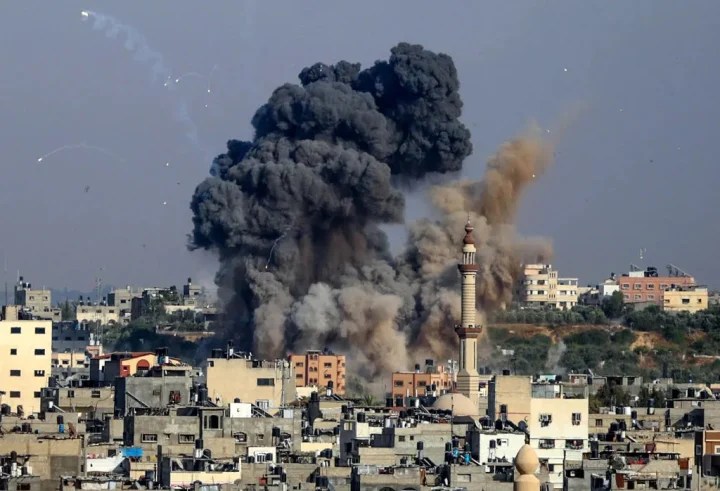Jerusalem, 13 May 1998. Khairi Alkam, a 51-year-old Palestinian labourer, left home early in the morning to pray at al-Aqsa mosque before going to work. As he was walking through the Mea She’arim neighbourhood, a suspected Jewish terrorist stabbed him in the back and left him to bleed to death in the street. He left behind a wife and nine children.
The crime horrified Israelis and Palestinians alike. Ezer Weizman, then president of Israel, visited Alkam’s widow Dalal to pay his respects and described the killing of her husband as ‘a murder by cowards’. Dalal was not eligible for compensation under the Victims of Hostile Actions (Pensions) Law – no perpetrator had been identified and the 1970 legislation was drafted with only Palestinian terrorism in mind. Nevertheless, the defence ministry authorised a six-figure payment. A mere token compared to a human life but a shuffle nonetheless towards Israel reckoning with its own extremists.
The veneration of violence within sections of Palestinian society is what has allowed Israel to become so complacent
Jerusalem, 27 January 2023. Khairi Alkam, a 21-year-old Palestinian named after his slain grandfather, entered the Neve Ya’akov community in the east of the city and opened fire outside the Ateret Avraham synagogue. Five people were killed in the initial salvo, including 14-year-old Asher Natan. Upon hearing gunfire outside, Eli and Natali Mizrahi, a married couple in their forties, left their dinner table and went to help the injured. They would never return. Alkam shot them both at point blank range.
This crime too horrified Israelis. When far-right national security minister Itamar Ben-Gvir arrived at the scene of the attack, locals shouted: ‘Come clean up the blood, it happened on your watch.’ It turns out voting for someone to hate the Arabs for you doesn’t do much for the Jews. Elsewhere, Mansour Abbas, head of the Islamist Israeli party Ra’am, said: ‘We condemn and reject any attack in which innocent civilians are murdered.’
Not everyone was on board with even that very specifically worded sentiment. The Palestinian Authority said ‘the Israeli occupation government’ was ‘fully responsible for the dangerous escalation’. This was a reference to an Israeli raid on a Palestine Islamic Jihad terrorist cell in the Samarian city of Jenin last Thursday, which killed ten including a civilian woman.
On Friday night, in Jenin, Ramallah, Nablus and East Jerusalem, Palestinians gathered to celebrate the synagogue murders. Crowds set off fireworks, started bonfires, fired their weapons into the air, honked car horns and chanted. In Hebron they handed out sweets to children while in Gaza cries of ‘Allahu akbar’ boomed from mosque loudspeakers. I include these details not to shock you. They shouldn’t, for such festivities are part and parcel of every Palestinian terrorist attack.
What effect do such scenes have on Israelis? Not much. They are so routine they barely notice them anymore. What effect do they have on Palestinians? That is another matter.
It’s not easy to get into the minds of people who celebrate the murder of 14-year-old boys, and I’m not sure it’s worth trying, but someone somewhere must be able to explain why anyone would pass this bloodlust onto children. Hand out enough candies and pastries every time an Israeli is murdered and you will teach your children that killing is sweet. The lesson will not go unlearned.
On Saturday, an Israeli army officer and his father were walking in the Ir David neighbourhood in Jerusalem when they were shot by an assailant hiding behind a parked car. They were taken to Shaare Zedek Medical Centre and are in serious but stable condition. Their assailant was a 13-year-old Palestinian boy armed with a semi-automatic handgun, who was himself seriously injured by return fire. He had left behind a message to his mother in a school notepad: ‘God, or victory, or martyrdom.’ That lesson did not go unlearned.
Hello ‘cycle of violence’, my old friend; I’ve come to talk with you again. Except, it’s not true. It’s not a cycle of violence. It’s a choice of violence, a choice Palestinians keep making. Don’t misunderstand me: I am under no illusions about Israel’s culpability in the conflict, about its methods, about its self-justifications, about its complacency over five million stateless Palestinians in Judea, Samaria and Gaza. But the tolerance – the veneration – of violence within sections of Palestinian society is what has allowed Israel to become so complacent.
When Jerusalem assures foreign audiences there is ‘no partner for peace’, it is a well-worn talking point but it is not easily rebutted. Mahmoud Abbas, president of the Palestinian Authority, will not visit any grieving widows after Friday night’s attack. The Palestinians will pay no compensation to bereaved Israelis – they couldn’t afford to. The Palestinian Authority operates a Martyrs’ Fund that pays stipends to the families of Palestinians captured or killed while carrying out terrorist attacks against Israelis. In 2020, the fund disbursed 597 million shekels (£139 million) in such payments. Sweets for the children, shekels for their widowed mothers.
Where does this get the Palestinians? Nowhere near a state, nowhere even close to the conditions necessary to achieving one. There is a 14-year-old Jewish boy in the ground and a 13-year-old Arab boy in serious condition in hospital. This is not an occasion for revelry or fireworks or knafeh, but for horror, lamentation, despair. Mourn the dead, comfort the living and grieve at the national self-sabotage that takes so many lives on the streets of Jerusalem.







Comments